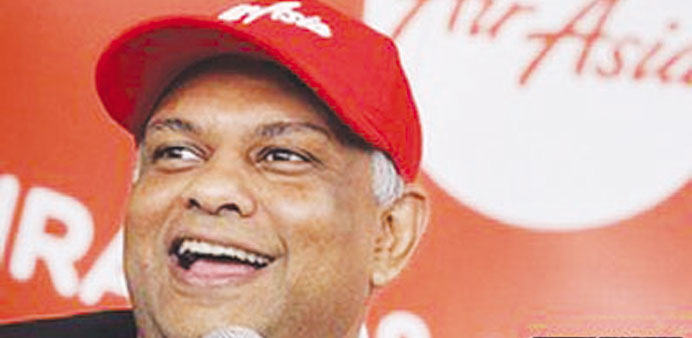“People and companies with good intentions to create jobs and make life of the average man better will always win”
Agencies/New Delhi
Asia’s largest low-cost carrier AirAsia won approval from India’s foreign investment panel yesterday to set up an airline in a joint venture with the giant Tata group, a government official said.
AirAsia, one of the pioneers of low-cost air travel in Asia, already connects Southeast Asia with some Indian cities such as Chennai, Bangalore, Kochi and Kolkata through its operations in Thailand and Malaysia.
The Foreign Investment Promotion Board has “approved AirAsia’s proposal to enter the civil aviation sector,” an Indian finance ministry official said.
AirAsia group chief executive Tony Fernandes, a former record industry executive who took over insolvent AirAsia in 2001 and turned it into one of the aviation sector’s biggest success stories, tweeted the news was “exciting.”
“Thank you all,” he said, adding: “People and companies with good intentions to create jobs and make life of the average man better will always win.”
AirAsia, headquartered in Kuala Lumpur, will have a 49% stake while Tata Group will hold 30%. The remainder will be held by entrepreneur Arun Bhatia’s Telstra Tradeplace.
The venture now has to obtain a flying licence from India’s aviation regulator, among other steps, and is aiming to start operations in May-June, the Economic Times reported on Tuesday.
Currently, six airlines operate domestic flights in the country - Air India, Jet Airways, Jet Lite, SpiceJet, IndiGo and GoAir.
IndiGo is the leading passenger carrier with a 27.3% of market share as of November last year, followed by Air India at 20.7% and SpiceJet at 19.5%.
The operating licence of the now defunct Kingfisher Airlines has been suspended since last year.
India’s first carrier was Tata Airlines, which took flight in 1932. In 1953, it was nationalised and renamed Air India.
The Tatas had earlier tried to start an airline with Singapore International Airlines in the mid-1990s, but could not succeed.
The other partner, Arun Bhatia, runs an aviation parts manufacturing firm, Hindustan Aerosystems, from New Delhi.
Meanwhile, Civil Aviation Minister Ajit Singh said he did not foresee any problem in the venture as long as all regulatory requirements were fulfilled.
“I don’t see any big hurdles. The aviation ministry will check procedures of taking no objection certificate, having two-thirds of India directors and others were followed,” Singh said.
However, the minister said the venture may face some procedural problems that would require certain clearances from FIPB.
Earlier, the civil aviation ministry had sought a clarification from FIPB on the new foreign direct investment policy in the domestic airline sector.
The ministry wanted to know whether the new rules were exclusively for existing domestic airlines or even for new start-ups.

